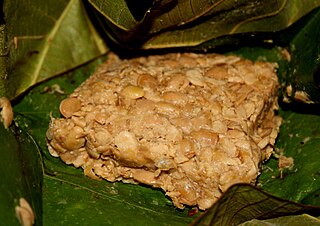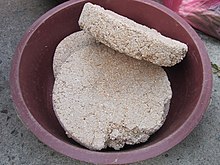
Bread is a staple food prepared from a dough of flour and water, usually by baking. Throughout recorded history and around the world, it has been an important part of many cultures' diet. It is one of the oldest human-made foods, having been of significance since the dawn of agriculture, and plays an essential role in both religious rituals and secular culture.

Sourdough or sourdough bread is a bread made by the fermentation of dough using wild lactobacillaceae and yeast. Lactic acid from fermentation imparts a sour taste and improves keeping qualities.

Palm wine, known by several local names, is an alcoholic beverage created from the sap of various species of palm trees such as the palmyra, date palms, and coconut palms. It is known by various names in different regions and is common in various parts of Africa, the Caribbean, South America, South Asia, Southeast Asia, and Micronesia.

Chhaang or chhyang is a Nepalese and Tibetan alcoholic beverage popular in parts of the eastern Himalayas among the Yakkha, Limbu, Dura, Newar, Sunuwar, Rai, Bhutia, Gurung, Magar, Sherpa, Tamang, Tharus and Lepcha communities. Among the Lepcha, it is called Chi. It is also known as jaarh in Nepal.

Fermented fish is a traditional preservation of fish. Before refrigeration, canning and other modern preservation techniques became available, fermenting was an important preservation method. Fish rapidly spoils, or goes rotten, unless some method is applied to stop the bacteria that produce the spoilage. Fermentation is a method which attacks the ability of microbials to spoil fish. It does this by making the fish muscle more acidic; bacteria usually cease multiplying when the pH drops below 4.5.

A ferment is a fermentation starter used in indirect methods of bread making. It may also be called mother dough.

In food processing, fermentation is the conversion of carbohydrates to alcohol or organic acids using microorganisms—yeasts or bacteria—without an oxidizing agent being used in the reaction. Fermentation usually implies that the action of microorganisms is desired. The science of fermentation is known as zymology or zymurgy.

Tapai is a traditional fermented preparation of rice or other starchy foods, and is found throughout much of Southeast Asia, especially in Austronesian cultures, and parts of East Asia. It refers to both the alcoholic paste and the alcoholic beverage derived from it. It has a sweet or sour taste and can be eaten as is, as ingredients for traditional recipes, or fermented further to make rice wine. Tapai is traditionally made with white rice or glutinous rice, but can also be made from a variety of carbohydrate sources, including cassava and potatoes. Fermentation is performed by a variety of moulds including Aspergillus oryzae, Rhizopus oryzae, Amylomyces rouxii or Mucor species, and yeasts including Saccharomyces cerevisiae, and Saccharomycopsis fibuliger, Endomycopsis burtonii and others, along with bacteria.
In the cuisine of Sikkim, in northeastern India, rice is a staple food, and fermented foods traditionally constitute a significant portion of the cuisine. Nepalese cuisine is popular, as Sikkim is the only state of India with an ethnic Nepali majority. Many restaurants in Sikkim serve various types of Nepalese cuisine, such as the Limbu, Newa and Thakali cuisines. Tibetan cuisine has also influenced Sikkimese cuisine. The combination of various cuisines has resulted in one specific cuisine.

Meju (Korean: 메주) is a brick of dried fermented soybeans. While not consumed on its own, it serves as the basis of several Korean condiments, such as doenjang, ganjang, and gochujang. Meju is produced by pounding, kneading, and shaping cooked soybeans, and undergoes fermentation with Aspergillus oryzae and/or Bacillus subtilis.

Kinema is a fermented soybean food, prepared by the Kirati communities of the Eastern Himalayas region: Eastern Nepal, and Darjeeling, Kalimpong and Sikkim regions of India. Kinema also known as Kinama, which is a traditional food of the Kirati people.

Tapuy, also spelled tapuey or tapey, is a rice wine produced in the Philippines. It is a traditional beverage originated from Banaue and Mountain Province, where it is used for important occasions such as weddings, rice harvesting ceremonies, fiestas and cultural fairs. It is produced from either pure glutinous rice or a combination of glutinous and non-glutinous rice together with onuad roots, ginger extract, and a powdered starter culture locally known as bubod. Tapuy is an Ilocano name. The wine is more commonly called baya or bayah in Igorot languages.

Jiuqu, also simply known as qu is a type of dried fermentation starter used in the production of traditional Chinese alcoholic beverages. The word jiuqu specifically refers to a type of yeast used to make alcohol such as huangjiu, baijiu and jiuniang.
Limosilactobacillus pontis is a rod-shaped, Gram-positive facultatively anaerobic bacterium. Along with other Lactobacillus species, it is capable of converting sugars, such as lactose, into lactic acid. Limosilactobacillus pontis is classified under the phylum Bacillota, class Bacilli, and is a member of the family Lactobacillaceae and is found to be responsible for the fermentation of sourdough, along with many other Lactobacillus species. This microorganism produces lactic acid during the process of fermentation, which gives sourdough bread its characteristic sour taste.

Sikhae is a salted fermented food in Korean cuisine prepared with fish and grains. Sikhae is made in the east coast regions of Korea, namely Gwanbuk, Gwandong, and Yeongnam.

Huangjiu is a type of Chinese rice wine most popular in the Jiangnan area. Huangjiu is brewed by mixing steamed grains including rice, glutinous rice or millet with qū as starter culture, followed by saccharification and fermentation at around 13–18 °C (55–64 °F) for fortnights. Its alcohol content is typically 8% to 20%.

Nuruk (Korean: 누룩) is a traditional Korean fermentation starter. It is used to make various types of Korean alcoholic beverages including takju, cheongju, and soju. It is an essential ingredient in Shindari and is mixed with rice. Historically, it was used in a variety of provinces of Korea, including Jeju Island.
Jyoti Prakash Tamang is an Indian food microbiologist, working on fermented foods and alcoholic beverages of the Himalayan regions of India, Nepal and Bhutan and South East Asia for last 36 years and the Senior Professor in Microbiology of the Sikkim Central University. Known for his studies on fermented food, Prof. Tamang is an elected fellow of the Indian National Science Academy (FNA), National Academy of Science, India (NASI),National Academy of Agricultural Sciences, Indian Academy of Microbiological Sciences and the Biotech Research Society of India. The Department of Biotechnology of the Government of India awarded him the National Bioscience Award for Career Development, one of the highest Indian science awards, for his contributions to biosciences in 2004, and International Centre for Integrated Mountain Development (ICIMOD)-Mountain Chair (2019-2022). Prof. Tamang was nominated as Global Kimchi Ambassador by World Institute of Kimchi of Government of South Korea.















